 This weekend marks the 246th anniversary of Independence Day, which celebrates when the thirteen colonies were no longer subject (and subordinate) to the monarch of Britain, King George III, and were united, free, and independent states. During the American Revolution, the legal separation of the thirteen colonies from Great Britain in 1776 actually occurred on July 2, when the Second Continental Congress voted to approve a resolution of independence declaring the United States independent from Great Britain’s rule. After voting for independence, Congress turned its attention to the Declaration of Independence. Historians have long disputed whether members of Congress signed the Declaration of Independence on July 4, even though Thomas Jefferson, John Adams, and Benjamin Franklin all later wrote that they had signed it on that day. Most historians have concluded that the Declaration was signed nearly a month after its adoption, on August 2, 1776, and not on July 4 as is commonly believed. By a remarkable coincidence, Thomas Jefferson and John Adams, the only two signatories of the Declaration of Independence later to serve as presidents of the United States, both died on the same day: July 4, 1826. And now on to this week’s logistics news.
This weekend marks the 246th anniversary of Independence Day, which celebrates when the thirteen colonies were no longer subject (and subordinate) to the monarch of Britain, King George III, and were united, free, and independent states. During the American Revolution, the legal separation of the thirteen colonies from Great Britain in 1776 actually occurred on July 2, when the Second Continental Congress voted to approve a resolution of independence declaring the United States independent from Great Britain’s rule. After voting for independence, Congress turned its attention to the Declaration of Independence. Historians have long disputed whether members of Congress signed the Declaration of Independence on July 4, even though Thomas Jefferson, John Adams, and Benjamin Franklin all later wrote that they had signed it on that day. Most historians have concluded that the Declaration was signed nearly a month after its adoption, on August 2, 1776, and not on July 4 as is commonly believed. By a remarkable coincidence, Thomas Jefferson and John Adams, the only two signatories of the Declaration of Independence later to serve as presidents of the United States, both died on the same day: July 4, 1826. And now on to this week’s logistics news.
- Waymo’s self-driving trucks will deliver home goods for Wayfair
- Cardinal Health starts Zipline drone deliveries of drugs and medical supplies
- Amazon plans two Prime shopping events this year
- US port backups are extending into freight rail supply chains
- Retail’s inventory glut means big business for liquidators
- Nestlé has cut greenhouse gases by 4 million tons since 2018
- Frito-Lay enhances focuses on drivers’ well-being for recruitment and retainment
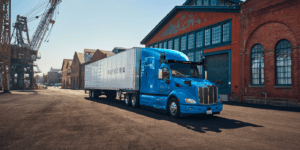 Everyone is excited for autonomous truck deliveries, but it remains to be seen how things shake out between pilot programs and full-scale rollouts, as well as how we define autonomy. Earlier this week, Waymo, announced that it will deliver home goods for Wayfair using its fleet of autonomous semi-trailer trucks. The deliveries will take place as part of a pilot that’s being conducted by Waymo and JB Hunt Transport Services to test out self-driving trucks along certain shipping routes in Texas. One of JB Hunt’s customers is furniture and home goods giant Wayfair, which will begin sending out deliveries using Waymo’s fleet for a six-week test this July and August. The deliveries will take place in Texas, with Waymo’s Class 8 autonomous truck hauling goods along Interstate 45 between facilities in Houston and Dallas, which was the route used by Waymo and JB Hunt during the original pilot last year. The trucks will operate autonomously but will be supervised by two Waymo employees, a commercially licensed driver and a software engineer, from the cab of the vehicle.
Everyone is excited for autonomous truck deliveries, but it remains to be seen how things shake out between pilot programs and full-scale rollouts, as well as how we define autonomy. Earlier this week, Waymo, announced that it will deliver home goods for Wayfair using its fleet of autonomous semi-trailer trucks. The deliveries will take place as part of a pilot that’s being conducted by Waymo and JB Hunt Transport Services to test out self-driving trucks along certain shipping routes in Texas. One of JB Hunt’s customers is furniture and home goods giant Wayfair, which will begin sending out deliveries using Waymo’s fleet for a six-week test this July and August. The deliveries will take place in Texas, with Waymo’s Class 8 autonomous truck hauling goods along Interstate 45 between facilities in Houston and Dallas, which was the route used by Waymo and JB Hunt during the original pilot last year. The trucks will operate autonomously but will be supervised by two Waymo employees, a commercially licensed driver and a software engineer, from the cab of the vehicle.
 Cardinal Health started air delivery of pharmaceutical products and medical supplies via Zipline drone in North Carolina. San Francisco-based Zipline won FAA Part 135 air carrier certification for the long-range flights earlier this month. The company flew its first commercial deliveries on June 22 with an initial 16-nautical-mile flight. The flights starting today are out of Zipline’s hub in Kannapolis, North Carolina, on behalf of Cardinal Health as well as Novant Health and Magellan Rx Management. Zipline said the hub can serve customers within a 7,800-square-mile area in as little as 15 minutes, with 98 percent lower emissions than traditional delivery options. The Zipline flights make Phoenix-based Magellan Rx Management the only national pharmacy benefits manager delivering prescription medications directly to patients at home using drones.
Cardinal Health started air delivery of pharmaceutical products and medical supplies via Zipline drone in North Carolina. San Francisco-based Zipline won FAA Part 135 air carrier certification for the long-range flights earlier this month. The company flew its first commercial deliveries on June 22 with an initial 16-nautical-mile flight. The flights starting today are out of Zipline’s hub in Kannapolis, North Carolina, on behalf of Cardinal Health as well as Novant Health and Magellan Rx Management. Zipline said the hub can serve customers within a 7,800-square-mile area in as little as 15 minutes, with 98 percent lower emissions than traditional delivery options. The Zipline flights make Phoenix-based Magellan Rx Management the only national pharmacy benefits manager delivering prescription medications directly to patients at home using drones.
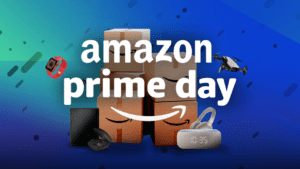 In a week and a half, Amazon will hold its annual Prime Day. New this summer is a 20 percent discount for Prime members to use on select everyday items at Amazon Fresh Stores. But that isn’t the only new aspect of Prime Day. This year, Amazon plans to hold a second shopping event for Prime members, occurring in the fourth quarter, which marks the first time the company will hold two such events in the same year. Some analysts have voiced concern that Prime Day has lost some of its appeal as other retailers have launched their own sales to coincide with Prime Day. The second Prime Day could be a big jump start to the holiday season as it was in 2020, when Amazon pushed Prime Day because of the Covid pandemic.
In a week and a half, Amazon will hold its annual Prime Day. New this summer is a 20 percent discount for Prime members to use on select everyday items at Amazon Fresh Stores. But that isn’t the only new aspect of Prime Day. This year, Amazon plans to hold a second shopping event for Prime members, occurring in the fourth quarter, which marks the first time the company will hold two such events in the same year. Some analysts have voiced concern that Prime Day has lost some of its appeal as other retailers have launched their own sales to coincide with Prime Day. The second Prime Day could be a big jump start to the holiday season as it was in 2020, when Amazon pushed Prime Day because of the Covid pandemic.
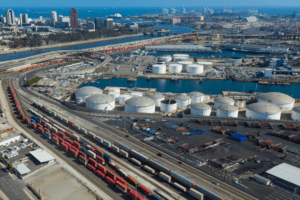 Port bottlenecks that have tied up US supply chains are spreading from the docks to the country’s freight rail networks, raising costs and adding new shipping complications for importers trying to manage the flow of goods. Some retailers are waiting weeks to move cargo by train out of Southern California’s ports of Los Angeles and Long Beach, while others are giving up on the railroads and shifting shipments of furniture, apparel and other consumer goods to trucks for long inland journeys on highways. The backups stretch to major freight hubs including the key transit point at Chicago, freight executives say, where containers have been piling up at rail yards. The congestion has led BNSF Railway Co., a unit of Berkshire Hathaway Inc. and one of the main rail operators connecting the US West Coast to inland points, to limit the number of boxes the railroad will carry out of the Southern California port complex.
Port bottlenecks that have tied up US supply chains are spreading from the docks to the country’s freight rail networks, raising costs and adding new shipping complications for importers trying to manage the flow of goods. Some retailers are waiting weeks to move cargo by train out of Southern California’s ports of Los Angeles and Long Beach, while others are giving up on the railroads and shifting shipments of furniture, apparel and other consumer goods to trucks for long inland journeys on highways. The backups stretch to major freight hubs including the key transit point at Chicago, freight executives say, where containers have been piling up at rail yards. The congestion has led BNSF Railway Co., a unit of Berkshire Hathaway Inc. and one of the main rail operators connecting the US West Coast to inland points, to limit the number of boxes the railroad will carry out of the Southern California port complex.
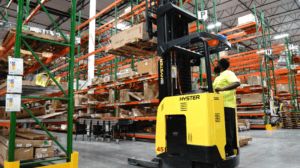 While some companies are suffering losses from excess inventory, others are making huge profits from it. Liquidators often buy excess and returned merchandise from retail giants, which they then sell to resellers and regular consumers typically at a much lower price. As retailers’ warehouses pile up with goods that are no longer seeing high demand, tapping liquidators is one of the methods retailers use to make room for other items. Several retailers have recently alerted investors and analysts that their inventory levels climbed as a result of supply chain delays as well as consumer spending shifting away from goods and more towards travel. Orders that can’t be canceled or sold at a discount tend to make their way to liquidators, and thanks to this phenomenon, demand for the services liquidators offer has grown significantly, leading to new partnerships and growth.
While some companies are suffering losses from excess inventory, others are making huge profits from it. Liquidators often buy excess and returned merchandise from retail giants, which they then sell to resellers and regular consumers typically at a much lower price. As retailers’ warehouses pile up with goods that are no longer seeing high demand, tapping liquidators is one of the methods retailers use to make room for other items. Several retailers have recently alerted investors and analysts that their inventory levels climbed as a result of supply chain delays as well as consumer spending shifting away from goods and more towards travel. Orders that can’t be canceled or sold at a discount tend to make their way to liquidators, and thanks to this phenomenon, demand for the services liquidators offer has grown significantly, leading to new partnerships and growth.
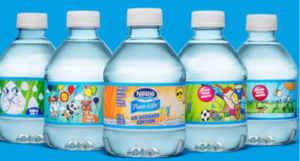 Nestlé has introduced a mission to be environmentally sustainable and work toward net-zero emissions by 2050. The trouble with this initiative is that the company has more than 2000 brands, and that’s a lot of plastic and potential waste. Nestlé hired South Pole, an external consultant to ensure that it is transparent and realistic about its promises. To that end, the company agreed to halve its CO2 emissions by 2030 and be net-zero by 2050. It is using Science-Based Targets that are in line with the Paris agreement. According to Nestlé, “s we enhance our ability to identify and measure emissions, and better use the data that has been disclosed by our suppliers and others, our monitoring will improve. We intend to also share our science-based methodology for calculating GHG emissions to help push new frontiers in climate data transparency for the food and beverage industry.”
Nestlé has introduced a mission to be environmentally sustainable and work toward net-zero emissions by 2050. The trouble with this initiative is that the company has more than 2000 brands, and that’s a lot of plastic and potential waste. Nestlé hired South Pole, an external consultant to ensure that it is transparent and realistic about its promises. To that end, the company agreed to halve its CO2 emissions by 2030 and be net-zero by 2050. It is using Science-Based Targets that are in line with the Paris agreement. According to Nestlé, “s we enhance our ability to identify and measure emissions, and better use the data that has been disclosed by our suppliers and others, our monitoring will improve. We intend to also share our science-based methodology for calculating GHG emissions to help push new frontiers in climate data transparency for the food and beverage industry.”
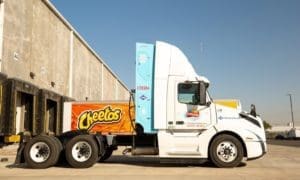 Frito-Lay, a division of PepsiCo, created a registered apprenticeship program, which aims to ensure high-quality training for new drivers with the goal of increasing driver recruitment and retention. The program is in partnership with the US Department of Transportation and the US Department of Labor. It came after the Biden administration’s Trucking Action Plan, which included a 90-day challenge to accelerate the expansion of registered apprenticeship programs. The company’s commitment also involves supporting drivers’ well-being. The program’s initiatives to retain drivers include funding for commercial driver’s licenses, safety training from seasoned drivers, and opportunities to support at the federal level through auditing Transportation Department documentation. In addition to the apprenticeship program, Frito-Lay’s truck driver benefits include competitive salaries, sign-on bonuses, health insurance packages that begin on the first day of employment, 401k enrollment with employer match and a pension benefit. The company also offers scholarship opportunities, education assistance for degree and vocational programs and assistance for parents of college-bound students.
Frito-Lay, a division of PepsiCo, created a registered apprenticeship program, which aims to ensure high-quality training for new drivers with the goal of increasing driver recruitment and retention. The program is in partnership with the US Department of Transportation and the US Department of Labor. It came after the Biden administration’s Trucking Action Plan, which included a 90-day challenge to accelerate the expansion of registered apprenticeship programs. The company’s commitment also involves supporting drivers’ well-being. The program’s initiatives to retain drivers include funding for commercial driver’s licenses, safety training from seasoned drivers, and opportunities to support at the federal level through auditing Transportation Department documentation. In addition to the apprenticeship program, Frito-Lay’s truck driver benefits include competitive salaries, sign-on bonuses, health insurance packages that begin on the first day of employment, 401k enrollment with employer match and a pension benefit. The company also offers scholarship opportunities, education assistance for degree and vocational programs and assistance for parents of college-bound students.
That’s all for this week. Enjoy the long weekend and the song of the week, Rage Against the Machine’s Freedom.

















